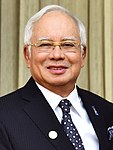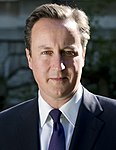2019 UK-Malaysia diplomatic crisis
The 2019 UK-Malaysia diplomatic crisis was a diplomatic crisis that occurred around June 2019. It was sparked by a state visit that month by the reigning Queen Alexandra of the United Kingdom, whom at the time of the crisis's unfolding, was conducting a state visit to the Southeast Asian country of Malaysia. Meanwhile, upon the arrival of the British entourage on Malaysian soil, they were met with a number of large protests and demonstrations held against the British monarch's visit to the country. However, throughout the entire duration of the state visit, no serious incident was ever recorded.
As a result of the crisis, relations between the two countries briefly soured, particularly as a result of a controversial interview involving the then-Prime Minister of Malaysia, Mahathir Mohammad, whose remark was negatively received and condemned by international observers. Ultimately, in the weeks following the crisis's end, relations between the United Kingdom and Malaysia were reportedly restored back to normal, with the Malaysian government having allegedly sent a formal apology statement to the British government, in response to the complications resulting from the crisis.
Background
Following the abdication of King William VI from the British throne on October 2017, his eldest daughter and successor subsequently ascended to the throne as Queen Alexandra, thereby becoming the new head of state of the United Kingdom. However, her traditional coronation would not take place almost two years later, as a result of the new Queen's preoccupation with her academic studies. Eventually, her coronation was indeed held two years later, that is, on May 11th 2019.
In around a month into her coronation, the newly coronated Queen Alexandra was scheduled to conduct a state visit to the Southeast Asian country of Malaysia, which prior to its independence in August 1957, was an important British colony in the region. At the time of the crisis, the serving Prime Minister of the United Kingdom is the Conservative politician, David Cameron, whom has been in office since May 2010, while in Malaysia, its prime minister at the time was Mahathir Mohammad of the Pakatan Harapan coalition, which a year prior to the crisis, had notably unseated the Barisan Nasional coalition, which had ruled the country since its independence. Mahathir himself was previously the country's fourth prime minister under the Barisan Nasional coalition before later defecting to the rival Pakatan Harapan coalition, where he served as the coalition's current chairman, in which capacity, he helped lead the coalition to their very first electoral victory in Malaysian history. Around that same time, the position of the country's head of state also underwent a notable change, when Sultan Muhammad V of Kelantan, whom was then the 15th King of Malaysia suddenly abdicated the throne, thereby paving way for the ascension of the 16th and current King of Malaysia, Sultan Abdullah of Pahang. On the other hand, just the year before, Sultan Muhammad V had infamously married the Russian-born former beauty pageant contestant, Oksana Voevodina. However, on July 1st 2019, the couple's marriage later came to an end, when the Malaysian royal divorced his Russian-born wife by a "talak tiga" or talaq baayin, considered in Islam to be an irrevocable divorce and the most severe form of divorce in the religion.
Crisis
The crisis began when in the days leading up to the eventual state visit, dated June 12th 2019, it was announced by both the British and Malaysian media that the British monarch was planning to visit Malaysia in her official capacity as the United Kingdom's head of state. Almost immediately, while the announcement received a largely lukewarm and indifferent response among the British public, it otherwise received an overwhelmingly negative response among the Malaysian public, particularly among the Malay majority in the country. As a result, in the following days after the announcement was made, politicians from both countries began to call for the planned state visit to be scrapped entirely, albeit for different reasons. Nevertheless, it was ultimately confirmed in an official statement published by the Foreign, Commonwealth and Development Office, which confirmed the plans for the aforementioned state visit, while its Malaysian counterpart would also do the same just a day later.
June 10
On June 10th, the president of the Malaysian Islamic Party, Abdul Hadi Awang declared in a sermon that "allowing this state visit by a Jewish-born queen would be no different than recognising and accepting Israeli delegates into our country". He also subsequently took to remind attendees of the sermon that "the British were the very people that gave the sacred land of Palestine to the Jews, and thus, when they send their very own Jewish queen to our country, we must never cave in and always fight and stand by our Islamic principles". On the other hand, Jacob Rees-Mogg, a leading Conservative politician and Member of Parliament for North East Somerset reiterated a previous call to have the planned state visit immediately terminated, citing "great security risks" concerning the state visit. He also later stated that "no responsible government would sacrifice or throw the Queen into a pack of wolves".
Meanwhile, according to a report later published by the Secretary of State for Defence after the conclusion of the state visit, a joint task force consisting of an undisclosed number of operatives from both the Special Air Service and the SRU units were then secretly flown to Malaysia days ahead of the British entourage, under the guise of conducting a "search and destroy" mission, in conjunction with Malaysian authorities.
June 12
Two days later, the planned state visit finally went into motion. Departing from Heathrow Airport in London, England, the British entourage would arrive at the Kuala Lumpur International Airport at 5:30 P.M local time, where the Queen and her entourage were received by Saifuddin Abdullah, the Minister of Foreign Affairs (he initially lost his position following the collapse of the Pakatan Harapan coalition government but was later reinstated under the new Perikatan Nasional coalition government). Soon afterwards, the British entourage was successively received by the King of Malaysia, Abdullah of Pahang at the royal residence of Istana Negara. In the midst of this, around thirty minutes after their arrival at the Istana Negara, crowds of protesters and demonstrators began to form outside of the royal compound, holding multiple banners and posters which a BBC correspondent described as being a mix of "ultranationalism, monarchism, and anti-Semitism". Nonetheless, the protesters were promptly cleared by local authorities, although they would later reconvene once more in front of the royal palace during the subsequent nightly hours, while the British entourage was being treated to a state dinner with the King and Queen of Malaysia.




